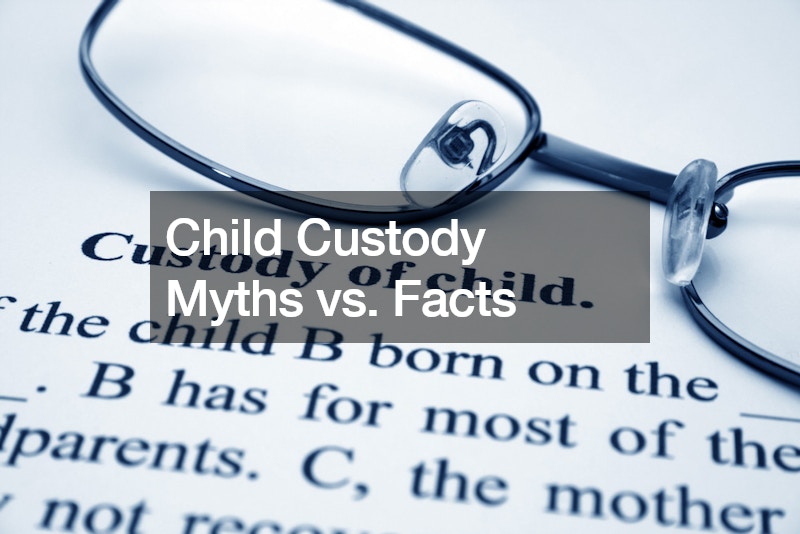Child custody matters are often fraught with misconceptions and misunderstandings, leading to confusion and unnecessary stress for parents navigating the legal system. In this article, we aim to dispel common myths surrounding child custody, providing clarity on the realities of these complex legal issues.
Myth: Once a custody order is in place, it cannot be changed.
Fact: Contrary to popular belief, custody orders are not set in stone. Circumstances may change over time, prompting the need for modifications to custody arrangements.
Whether due to a parent’s relocation, changes in the child’s needs, or shifts in parental circumstances, child custody modification is possible with sufficient justification and adherence to legal standards.
Myth: Custody modifications are easy to obtain.
Fact: While modifications are feasible under certain conditions, they are not granted arbitrarily. Courts require compelling reasons for altering existing custody arrangements, prioritizing the best interest
s of the child above all else. Any proposed modifications must demonstrate a substantial change in circumstances that warrants revisiting the original custody order.
Myth: Parents can modify custody arrangements at will.
Fact: Parents cannot unilaterally modify custody arrangements without court approval. Any changes to custody orders must go through the legal process, involving formal petitions and judicial review. Attempting to alter custody arrangements outside of the legal framework can result in legal repercussions and undermine the stability of the child’s living situation.
Myth: Custody modifications are solely based on parental preferences.
Fact: The primary consideration in custody modification proceedings is the welfare of the child. Courts evaluate various factors, including the child’s relationship with each parent, their living environment, and their overall well-being. Parental preferences may be considered, but they are secondary to the child’s best interests.
Myth: Modifying custody arrangements is a quick process.
Fact: Child custody modification proceedings can be lengthy and complex. Courts meticulously review evidence and legal arguments to ensure that any changes serve the child’s best interests. Delays may occur due to scheduling conflicts, evidentiary hearings, and the need for thorough deliberation by the court.
Myth: Once granted, custody modifications are permanent.
Fact: Custody modifications are subject to review and adjustment over time. As children grow and circumstances evolve, the need for further modifications may arise. Courts retain jurisdiction to revisit custody arrangements as needed, ensuring that they remain aligned with the child’s evolving needs and best interests.
Myth: Custody modifications are only necessary in contentious situations.
Fact: Even in amicable co-parenting arrangements, circumstances may change, necessitating modifications to custody agreements. Relocations, changes in work schedules, or the child’s evolving needs may warrant adjustments to custody arrangements. Seeking timely modifications can prevent conflicts and promote the child’s stability and well-being.
Myth: Custody modifications favor one parent over the other.
Fact: Custody modification proceedings are impartial and focused on the child’s best interests. Courts consider each parent’s ability to provide a safe and nurturing environment for the child, prioritizing parental involvement and cooperation whenever possible. The goal is to ensure that the child maintains meaningful relationships with both parents, barring any extenuating circumstances that may compromise their well-being.
Child custody matters are often emotionally charged, and misconceptions can exacerbate tensions between parents. By debunking prevalent myths and emphasizing factual information, parents can approach custody issues with a clearer perspective and better prepare themselves for the legal process.
One crucial aspect to consider is the role of the court in custody modification proceedings. While parents may harbor beliefs about their ability to unilaterally alter custody arrangements, the legal reality underscores the necessity of judicial oversight. Courts serve as impartial arbiters, weighing evidence and legal arguments to ensure that any modifications align with the child’s best interests.
Furthermore, the misconception that custody modifications are solely based on parental preferences neglects the paramount importance of the child’s well-being. Courts prioritize factors such as the child’s relationship with each parent, their emotional and physical needs, and the stability of their living environment. Parental wishes may inform the court’s decision-making process, but they are secondary to the overarching goal of safeguarding the child’s welfare.
It’s also essential to recognize that custody modification proceedings are not always contentious endeavors. Even in amicable co-parenting situations, changes in circumstances may necessitate adjustments to custody arrangements. Proactively addressing evolving needs and circumstances can foster cooperation between parents and mitigate potential conflicts down the line.
Moreover, the misconception that custody modifications are permanent fails to acknowledge the dynamic nature of family dynamics. As children grow and circumstances evolve, the need for revisiting custody arrangements may arise. Courts retain jurisdiction to ensure that custody arrangements remain responsive to the child’s changing needs and circumstances, promoting their ongoing well-being and stability.
In conclusion, understanding the realities of child custody modifications is essential for parents navigating the legal system. By debunking common myths and embracing the facts, parents can approach custody matters with clarity, confidence, and a focus on their child’s best interests. Seeking legal guidance and adhering to the legal process is crucial for achieving fair and sustainable custody arrangements that promote the well-being of all parties involved.
.








